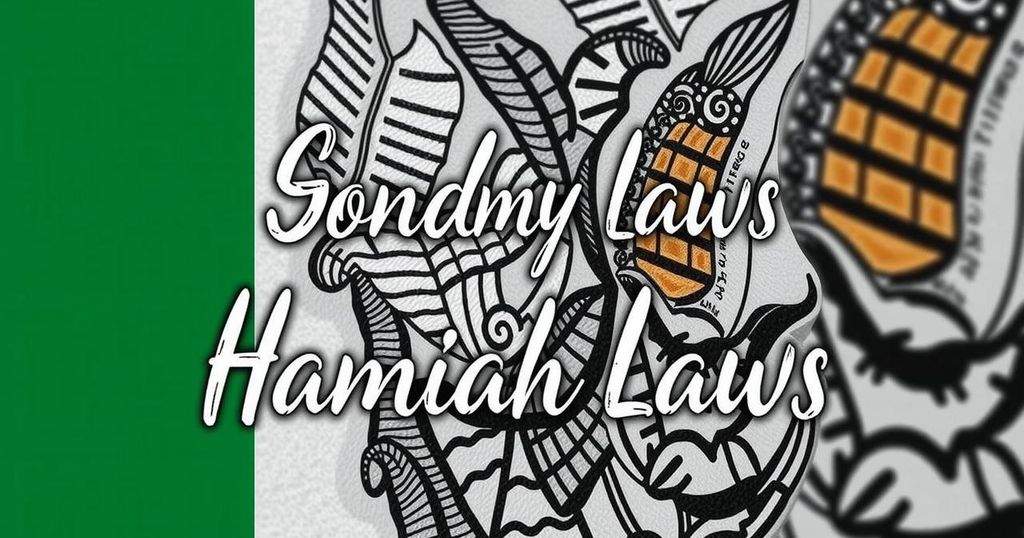Politics
ABUJA, AFRICA, AMNESTY INTERNATIONAL, ANGOLA, BOTSWANA, DEMOCRACY, DISCRIMINATION, FESTUS MBANDEKA, HIGH COURT, HOME AFFAIRS, SAFETY, AND, HUMAN RIGHTS, HUMAN RIGHTS WATCH, INTERNAL AFFAIRS MINISTRY, LGBT RIGHTS, NAMIBIA, NAMIBIAN BROADCASTING CORPORATION, NGOS BUREAU, NIGERIA, OMAR VAN REENE, PREMIUM TIMES, SOUTH AFRICA, UGANDA, VAN REENE, YVONNE DAUSAB
Isaac Bennett
0 Comments
Namibian Government Appeals Unconstitutional Ruling on Sodomy Laws
The Namibian government has appealed a High Court ruling that deemed sodomy laws unconstitutional, igniting debate over LGBTQ+ rights in the country. Advocacy leaders believe the appeal caters to conservative viewpoints rather than progressive values. The ruling challenges lingering colonial laws and highlights the tension between traditional beliefs and modern human rights advocacy across Africa.
The Namibian government has filed an appeal against a recent High Court ruling that declared the country’s sodomy laws, remnants from the apartheid era, unconstitutional. This ruling has sparked considerable debate, with prominent government figures, including Justice Minister Yvonne Dausab, indicating their desire to defer the matter to the Namibian Supreme Court. Omar van Reene, a key figure in the Namibia Equal Rights Movement, argued that the appeal serves to appease a conservative voter base and continues to promote discriminatory attitudes against LGBTQ+ individuals in Namibia. Following Namibia’s independence in 1990, there have been discussions surrounding outdated laws and their relevance in modern society. The High Court’s ruling indicates a significant shift toward recognizing human rights within the nation, a move that other African countries, like Botswana and Angola, have embraced by decriminalizing similar laws. The Supreme Court ruled last year that same-sex marriages conducted abroad must be recognized in Namibia, a decision met with criticism from various sectors. In light of these developments, van Reene expressed optimism that the Supreme Court will uphold constitutional rights, reinforcing the principle that apartheid-era statutes have no place in a new Namibia.
The recent engagement of the Namibian government in appealing against the High Court ruling highlights the lingering effects of colonial-era legislation on contemporary legal frameworks in Namibia. The sodomy laws, established during the apartheid regime, have been contested in recent years as societal attitudes toward LGBTQ+ rights evolve across Africa. The appeal to the Supreme Court reflects a broader struggle between progressive movements seeking equality and governmental avenues aiming to maintain traditional values, which often manifest as opposition to LGBTQ+ rights. In the context of Africa, this issue carries historical, social, and legal implications as different nations navigate the legacy of colonialism and the pursuit of human rights.
The appeal by the Namibian government against the High Court’s ruling on sodomy laws underscores the ongoing tension between advancing human rights and entrenched conservative views within the nation. Advocacy groups, represented by figures such as Omar van Reene, remain hopeful that the Supreme Court will reaffirm constitutional protections for LGBTQ+ individuals, thereby solidifying the fight for equality in Namibia. As the continent grapples with similar issues, Namibia’s legal outcomes could set precedents for future discussions about human rights and laws in other African nations.
Original Source: www.washingtonblade.com




Post Comment